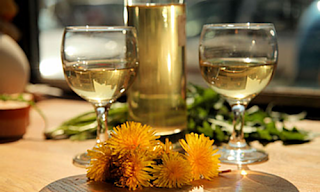 |
| Nancy Klehm, Mellow Yellow, Root Simple |
***
Making wine is a good exercise in patience; fruit wines require 6 months to a year or more for aging and dandelion wine is considered a fruit wine, though it's made from the flowers. As for the taste, one writer calls it Mellow Yellow. About the benefits of dandelion wine, Nancy Klehm says:As a beyond-perfect diuretic, dandelion has so much potassium that when you digest the plant, no matter how much fluid you lose, your body actually experiences a net gain of the nutrient. In other words, folks – dandelion wine is one alcohol that actually helps your liver and kidneys! Generous, sweet, overlooked dandelion…There are many recipes online for the wine. Check out Mother Earth News, wikiHow, Epicurious, Allrecipes, and Crow River Winery, among others. The Epicurious recipe doesn't include yeast and calls for letting the prepared mixture to stand for two weeks, then filter and refrigerate, hence it's not really a wine. The voices that seem to me to have the most authority--Jack Keller, HomeBrewTalk, and Crow River Winery--advise letting the wine age for a minimum of 6 months.
Jack Keller gives a variety of recipes for dandelion wine (30!) and explains that
Dandelion wine is typically a light wine lacking body. Thus many recipes use raisins, sultanas or white grape juice (or concentrate) as body-builders, but you could use dates or figs or rhubarb instead. Whatever you use will affect the color, so white or golden raisins or sultanas, or golden figs, are usually used with dandelions (some of these are usually available in bulk at Sun Harvest, Giant Foods, or many other stores).
Many of these recipes call for 3 lbs granulated sugar per gallon of wine -- some even call for 4. Personally, this is too much for me. Whether this much sugar will produce a dry, semi-sweet or sweet wine will depend on whether you attempt to stabilize the wine and on the yeast you use, as those which are tolerant of higher concentrations of alcohol will still result in drier wine unless even more sugar is added. People should make what they like. If you like dry wine with a reasonable (12% alcohol level), use only enough sugar to achieve a starting specific gravity of 1.088. If you like sweet wine, many of the recipes below will produce it providing you don't use a high-alcohol tolerant yeast. Personally, I prefer my dandelion wines dry to semi-sec, with a finished specific gravity of 1.002 to 1.006.
If you omit the body-building ingredient, dandelion wine is light and invigorating and suited perfectly for tossed salad and baked fish (especially trout). If you ferment with a body-enhancer but shave the sugar, the wine will serve well with white-sauced pastas, heavier salads, fish, or fowl. Sweetened, it goes well before or after dinner.
For all recipes the basic ingredients are dandelion flowers, sugar, varying amounts of citrus, water, and yeast. Many of the instructions advise picking the flowers at mid-day, when they're fully open. (Have you ever noticed that dandelions don't open on cloudy days?) And many recipes advise omitting all of the dandelions' green matter; also to be careful not to include the citrus' porous white tissue (or pith).
***
 |
| John Wright's dandelion wine, theGuardian |
***
Googling 'wine making supplies' will get you started on what kinds of equipment you need and where to buy. There are kits for making fruit wines. Also Jack Keller has an article on Getting Started with a list of necessary equipment and supplies.
Author Ray Bradbury in his book Dandelion Wine presented the wine as metaphor for summer.
-- Marge

No comments:
Post a Comment